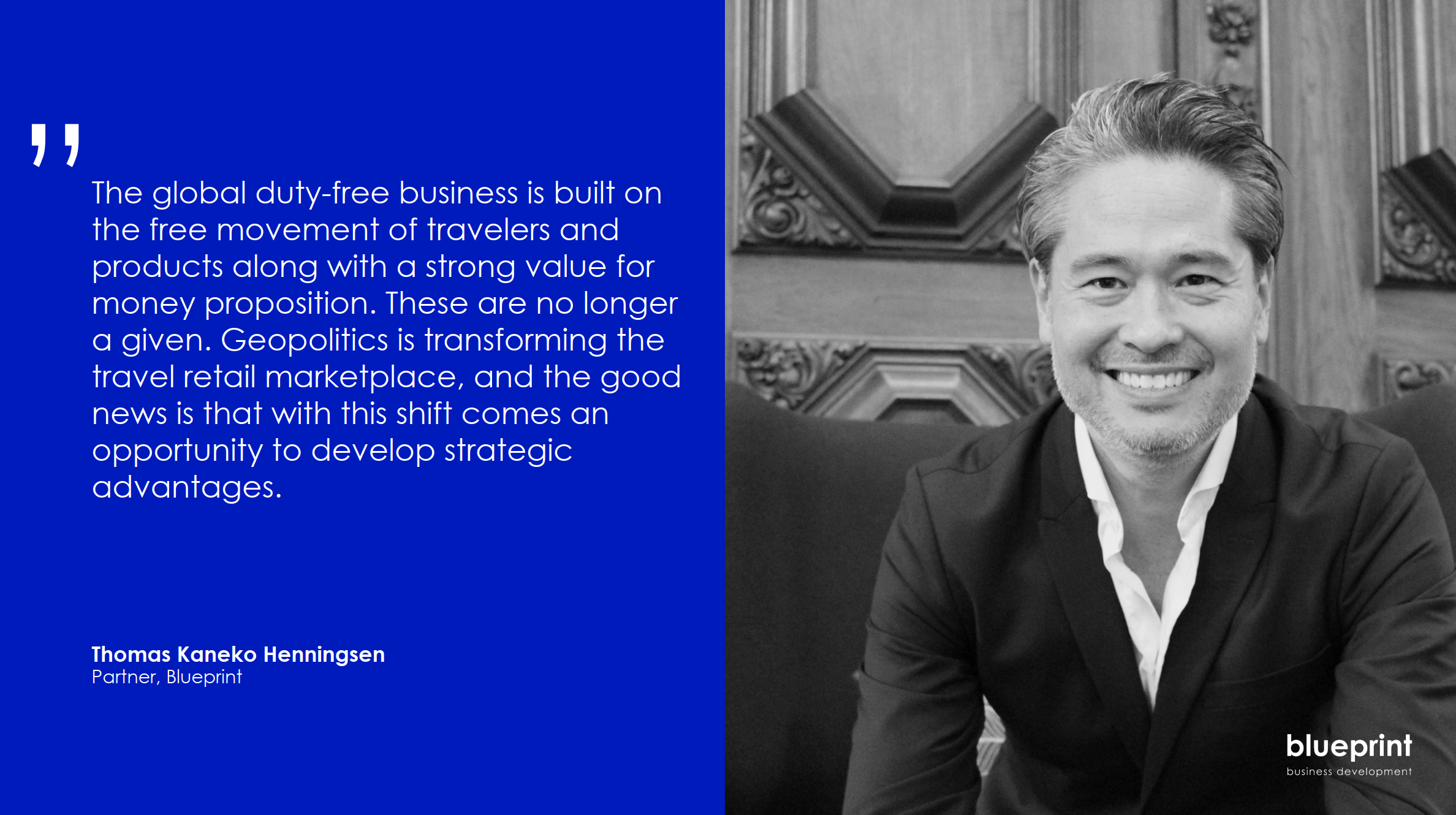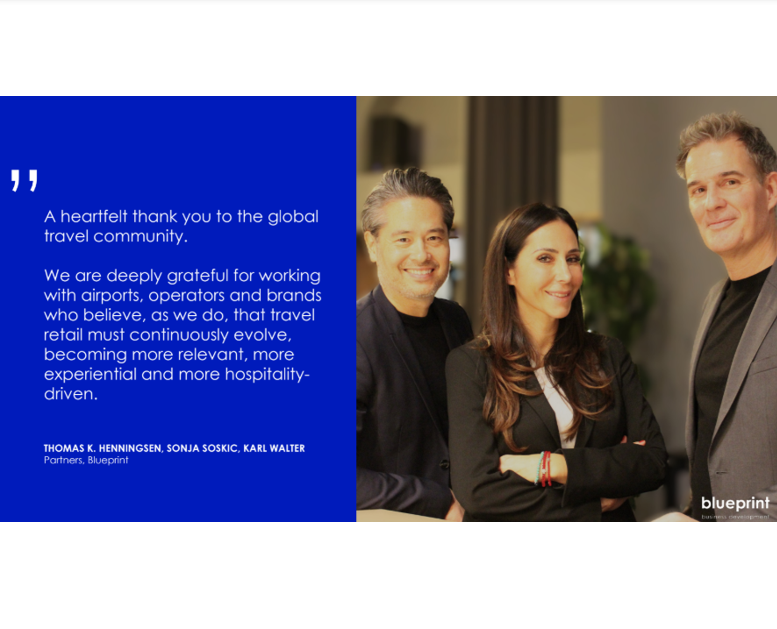August 28, 2025
Blueprint maps a geopolitical game plan for travel retail
As geopolitical power shifts reshape travel retail, Blueprint outlines how the industry can prepare, adapt and gain a strategic edge
Geopolitics isn’t just a buzzword. With the right mindset and tools, it can become a competitive advantage. Because in today’s world, the travel retail channel – as with any other global industry – is exposed to unpredictability and instability powered by geopolitics. Gaining a strategic edge from geopolitics will depend not only on preparing for multiple possible futures, but on being ready to respond and adapt as they unfold.
Copenhagen-based travel retail consultancy Blueprint has added geopolitics to its list of megatrends capable of profoundly changing the travel retail marketplace. “We advise travel retail companies on how megatrends like Gen Z, artificial intelligence, experiential retail and sustainability shape the airport experience,” says Blueprint Partner Thomas Kaneko Henningsen. “As for geopolitics, it no longer sits outside the airport terminal; it is inside the terminal, shaping what’s sold, who shops and how travelers spend. From trade tensions to visa policies, political shifts create ripple effects that shape shopping on the go.”

Geopolitical turbulence
The Western-led world order is shifting fast perhaps, more dramatically than at any time since World War II, the rate of change even surpassing the end of the Cold War. The signs are everywhere: China and India asserting themselves as global powers, COVID-19 policies disrupting global travel and supply chains, wars escalating in Europe and the Middle East, anti-globalist movements gaining traction in Western democracies, trade wars, and the U.S. pivoting to Asia.
Signs of geopolitics creating global turbulence worldwide:
- Tariffs and trade uncertainty are dampening the outlook for the developing Asia Pacific region, with the growth forecast downgraded to 4.7% for 2025 and 4.6% for 2026.
- The United States will require international visitors to pay a new “visa integrity fee” of at least $250, added to existing visa costs, and is also proposing applicants for business and tourist visas to post a bond of up to $15,000 to enter the country.
- While tourism is booming across the rest of the world this year, the U.S. is missing out on tens of millions of international visitors who are choosing to travel elsewhere, costing the economy up to $29 billion and risking millions of jobs.
- A new report from SAS shows that Scandinavia has lost over 1.2 million departing airline seats in 2024 compared to pre-crisis levels. This is a direct consequence of closed airspace over Belarus, Russia and Ukraine. Geopolitical instability in Asia and the Middle East is also helping drive this decline.
No surprise, then, that geopolitics is back at the top of the corporate agenda. For decades, companies operated in a relatively stable global system; companies invested in Western democracies could serve customers worldwide within clear and predictable frameworks. That era is over.
In reality, geopolitics has always mattered. Previously, Western companies were simply on the “right” side of the fence. Now that rules and alliances are shifting, travel retail must realign. Scenario planning based on geopolitical insights is no longer optional; it is becoming essential.
A strategic approach
“We see travel retail as a frontline responding to global uncertainty,” says Kaneko-Henningsen. “It raises questions such as, “How can industry stakeholders proactively adapt to geopolitical changes?” and “So much seems random, isn’t it safer to wait and adapt?”
“The short answer is that travel retail companies can and must act,” states Rud Pedersen Group’s Chief Strategy Officer Jonatan Tylsgaard Larsen. With more than 600 highly specialized partners and employees operating in 20 offices across 19 European countries, Rud Pedersen Group is carefully monitoring the geopolitical landscape.
Together with Rud Pedersen, Blueprint is offering its consulting services to travel retail stakeholders ranging from trend analysis, sparring sessions and scenario planning to webinars and public speaking.

Stress test
“The global duty free business is built on the free movement of travelers and products along with a strong value for money proposition. These are no longer a given,” says Kaneko-Henningsen, continuing, “Geopolitics is transforming the travel retail marketplace and the good news is that with this shift comes an opportunity to develop strategic advantages.”
To stay ahead, travel retail must prepare and respond to geopolitical shifts in the following ways:
- Track the underlying shifts, not just the headline
The news cycle can be overwhelming and misleading. What matters more are long-term trends, such as the U.S. pivoting to Asia, China's Belt and Road strategy, Russia's security doctrine, or the EU's pursuit of strategic autonomy. Look beyond short-term events and focus on structural changes that shape the operating environment.
- Understand how political trends influence consumer behavior
Geopolitics doesn't just play out in parliaments; it shapes consumer identities. Issues like climate, food and national loyalty increasingly influence shopping behavior. This of the rising skepticism towards U.S. brands in parts of Europe; this shapes political pressure and market access alike.
- Map geopolitical exposure
Not every global event affects travel retail equally. Where are the travel retail stakeholders vulnerable to regulatory shifts, sanctions or political instability? Equally important, where could geopolitical shifts open new doors for the travel retail channel?
- Develop real scenarios and monitor accordingly
Based on trends and exposure, build a limited number of strategic scenarios. Then assign monitoring responsibilities. Scenario planning isn't about predicting the future; it's about preparing for several plausible outcomes and staying alert to which path the world is taking.
- Build a reaction model and train for it
Preparation isn’t enough. Companies need a geopolitical response model based on who acts, how fast, and with which tools. This might include awareness training, risk mitigation plans, regulatory engagement strategies and consumer-facing campaigns.
“Companies that embed geopolitical foresight into their travel retail strategies are better equipped to handle shocks and seize opportunities,” says Tylsgaard Larsen. He elaborates, “Ways of staying ahead and informed include emphasizing or de-emphasizing country-based brand endorsements, proactively updating stakeholders and actively supporting industry associations navigating political landscapes are ways of staying informed and ahead.”




